Insurrectionary Forms & Radical Lineages
We know that art alone is not revolution, that art alone is not the answer to the questions of how life be otherwise; and yet we still home in on its emergent possibilities to be the unpredictable event, to be the insurrection that propels, sustains, and transforms, to be at once “essence, science, and vision,” as Amiri Baraka argued. And so how can we write with revolutionary force; and what might be the insurrectionary forms capable of breaking through the carapace of the twenty-first century; how can we extend the lineage of thinking, writing, and performance in which art is “our magic weapon to create and recreate the world and our selves as a part of it.” How can art lead us into, or catalyze the ungovernable, transdisciplinary forms of practice and urgency needed to meet our contemporaneity.
This search for a living, insurrectionary, and radical lineage that can carry us into habitable future will inflect our time together––our temporary community, troupe, band, cell, and assembly. We’ll test the open question that writing always is through experiments with the line, the sentence, the song, the bodies that articulate them all in lived social critique; we’ll listen and abide with one another in conversation and debate, always staying open to the happy accident of collective work, the shock of recognition in the new friend, that is the ground and pleasure of collaboration. And through it all––and continuing–––we’ll take the abolitionist urgency of Jackson Mac Low’s “Social Project 2” as our signal energy, desire, and dream: “FIND A WAY TO END WAR // MAKE IT WORK”
Workshop Faculty for Week 3
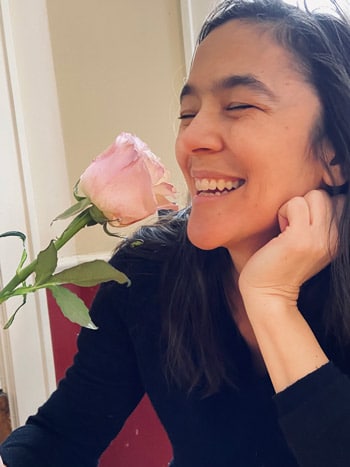
Hyperdiction :: Joyelle McSweeney
Let’s investigate the premise and promise of hyperdiction, an intensive use of language rife with political and aesthetic possibility. Hyperdiction is a vivid, viscous soundprint, an uncanny sonic ecology; it is an assemblage of the voices, sounds, dictions, languages, lingos, terminologies, and slangs a person encounters in their experience of life, art, dream, ghost, family, community, region, work, subculture, the state, studies, etc. Through guided writing and listening, participants will bring into audibility their own hyperdictions, then investigate the aesthetic and political possibilities of hyperdiction for performance, translation, dream terrains, ecologies, angelic encounters, garments and riddles, among other cosmic and lyric endeavors. We’ll also enjoy brief inspirational encounters with works by authors such as Dolores Dorantes tr. Jen Hofer, Hiromi Itō tr. Jeffrey Angles, Douglas Kearney, Harryette Mullen, Tommy Pico, Juan Carlos Bustriazo Ortiz tr. Michelle Gil-Montero, Keats, and Eva Kristina Olsson tr. Johannes Göransson.
As a poet, prose writer, playwright, critic and publisher, Joyelle McSweeney is interested in the ways in which writing moves among genres, languages, media, and materials. She is the author of ten books, most recently the double poetry collection Toxicon and Arachne (Nightboat Books), a finalist for the 2020 Kingsely Tufts Prize; The Necropastoral: Poetry, Media, Occults (University of Michigan Poets on Poetry series) a book of goth eco-criticism; and the verse play Dead Youth, or, the Leaks, which won the inaugural Leslie Scalapino Prize for Innovative Women Playwrights. With Johannes Göransson, McSweeney founded and edits Action Books, an international press for poetry and translation, and has supported authors such as Raúl Zurita, Kim Hyesoon and Don Mee Choi. In 2022, McSweeney was named a Literature Fellow of the American Academy of Arts and Letters. She lives in the Rust Belt and teaches at Notre Dame.
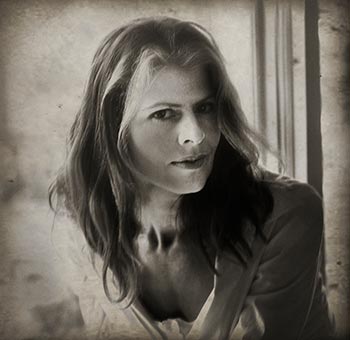
Cells Spill & Kin Can Open Lineages: Specimen, Species, Poetics of Relations :: Eleni Sikelianos
Family lineage, poetry lineage, animal lineage, deep lineage: which do we elect and which do we learn to live with? How do we reinscribe notions of lineage that honor our past and our future making/living? We will unravel and play with the various strands in this sometimes trembling inquiry. We will think about species mergers that operate like similes and other chimeric, hybrid forms that create new beings, and we will work to wake up our deep inner evolution. Our starting and end point: lineage, in its profoundest sense, vibrates with the ways our lives are intertwined, even genetically, with the plants and animals around us. Methodology: reading, talking, writing, playing among poems, biology, philosophy, images, maybe even movement.
Eleni Sikelianos, a graduate of the Kerouac School, is the author of nine books of poetry, most recently What I Knew (Nightboat Books) and Your Kingdom (forthcoming), and two hybrid memoirs (The Book of Jon, City Lights and You Animal Machine, Coffee House Press). Working in ecopoetics for decades, her writings are deeply influenced by family as well as animal and planetary lineages, and have been much anthologized and translated. Dedicated to the many ways poetry manifests in communities, she has taught workshops in public schools, homeless shelters, and prisons, and collaborated with musicians, filmmakers, and visual artists, among them Philip Glass and Ed Bowes.
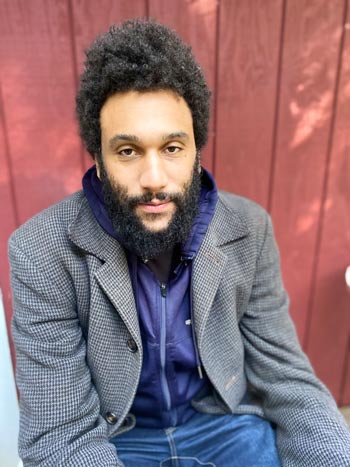
Let Unity Do The Work :: Tongo Eisen-Martin
The objective of this workshop is to share strategies for writing and editing poems generated by the idea that your poetry is a part of your one human experience taking place in and revealed by an interconnected reality. The view of craft as component can wall away potential insight and inhibit writing. Writing strategies that flow from the reality that craft does not have to be a metaphysical, separate entity from you strengthens all internal processes of liberation, importantly including your art. From political to unpopulated realities of the world, all continuums of existence can emerge together in a line of poetry within a cooperation to produce insight. You can let the infinite, natural occurring unities of reality do the work for you on the page. We will also pay critical attention, and practice the recitation and performance of our works.
Originally from San Francisco, Tongo Eisen-Martin is a poet, movement worker, and educator. His latest curriculum on extrajudicial killing of Black people, We Charge Genocide Again, has been used as an educational and organizing tool throughout the country. His book titled, Someone’s Dead Already was nominated for a California Book Award. His book Heaven Is All Goodbyes was published by the City Lights Pocket Poets series, was shortlisted for the Griffins Poetry Prize and won a California Book Award and an American Book Award. His latest book Blood On The Fog was released this fall in the City Lights Pocket Poets series. In 2020, he co-founded Black Freighter Press to publish revolutionary works. He is San Francisco’s eighth poet laureate.
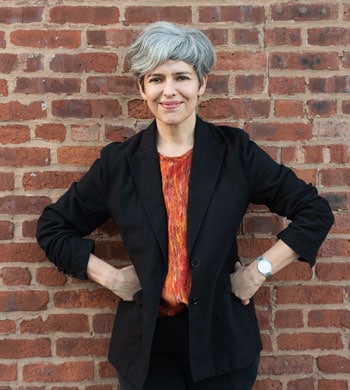
“No Such Thing as Repetition” :: Mónica de la Torre
Incantation, memory aid, patterning device, inevitable component of the trial-and-error method, compulsion… Just what is repetition and how does it work? Does it harmonize or disrupt meaning? In “Portraits and Repetitions,” Gertrude Stein claims: “There is no such thing as repetition. Only insistence.” Then she asks: “A thing that seems to be exactly the same thing may seem to be a repetition but is it.” What does it entail when it takes the form of narrative conceit or artistic reenactment? More urgently, how can it lead to the emergence of the new? We will engage writing by Samuel Beckett, Jorge Luis Borges, João Cabral de Melo Neto, Federico García Lorca, Renee Gladman, Ana Hatherly, Tan Lin, Layli Long Soldier, Lisa Robertson, María Sabina, Norman Pritchard, and Raymond Queneau, among others. We will also consider repetition’s manifestations in the visual arts and performance in order to generate writing that, as Deleuze would have it, makes “something new of repetition itself.”
Mónica de la Torre is a poet and essayist born and raised in Mexico City whose writing engages translation, performance, and the visual arts. Her most recent book is Repetition Nineteen (Nightboat), which centers on experimental translation. Other books include The Happy End/All Welcome (Ugly Duckling Presse)—a riff on Kafka’s Amerika—and Public Domain. She has published several books in Spanish, including Taller de Taquimecanografía (Tumbona), written jointly with the eponymous women artists’ collective she co-founded. She is a contributing editor to BOMB Magazine; an editor for Señal, Ugly Duckling Presse’s chapbook series of Latin American poetry in translation; and with Alex Balgiu, co-edited the anthology Women in Concrete Poetry 1959–79 (Primary Information). Her work has appeared in Midst, Artforum, Granta, the Believer, the Paris Review, and NY Review, among other publications. She is recipient of the 2022 Foundation for Contemporary Arts C.D. Wright Award for Poetry and a 2022 Creative Capital grant. She teaches poetry at Brooklyn College.

RACIALIZED CHRONOLOGIES: ALTERNATIVE TEMPORAL STRUCTURES IN CONTEMPORARY POETRY :: Anaïs Duplan
Or, a study of why Black people are always late.
In 2019, curator Meg Onli presented a three-part exhibition, Colored People Time, at the Institute of Contemporary Art in Philadelphia. Onli’s engagement with the phrase “colored people’s time” drew attention to the role of temporal structures in socioracial control. Similarly, scholars of African American Vernacular English ––such as the beloved poet and activist June Jordan––have drawn attention to the unique temporal opportunities of Black English, including tense structures (you stay doin’ that) that exist only there. Through a survey of Black contemporary poetry and theoretical writings on Black temporality, RACIALIZED CHRONOLOGIES seeks to articulate the temporally-based strategies of refusal emanant in Black poetry. Moving away and against punctuality, we survey the slow time of “racial melancholia” (in the words of David L. Eng and Shinhee Han); the quickness of mania, neuroticism, and anxiety; and the cyclic nature of Black death and grief. So too we ruminate on Rasheedah Phillips’ concepts of “temporal abundance”, along with what Daylanne K. English calls “strategic anachronism” and “strategic presentism.”
Anaïs Duplan is a trans* poet, curator, and artist. He is the author of I NEED MUSIC (Action Books) and a book of essays, Blackspace: On the Poetics of an Afrofuture (Black Ocean). He is a professor of postcolonial literature at Bennington College, and has taught poetry at The New School, Columbia University, and Sarah Lawrence College, amongst others. As an independent curator, he has facilitated curatorial projects in Chicago, Boston, Santa Fe, and Reykjavík. He was a 2017-2019 joint Public Programs fellow at the Museum of Modern Art and the Studio Museum in Harlem, and in 2021 received a Marian Goodman fellowship from Independent Curators International for his research on Black experimental documentary. He is the 2021 recipient of the QUEER|ART|PRIZE for Recent Work. In 2016, Duplan founded the Center for Afrofuturist Studies, an artist residency program for artists of color, based at Iowa City’s artist-run organization Public Space One.
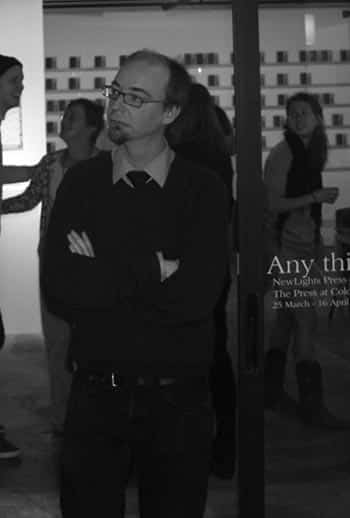
The Public Press :: Aaron Cohick
Harry Smith Printshop
What could happen if poetry were written for and in a public, physical, and collective space? What if writing, printing, and publishing were combined into a single gesture? In this workshop we will use low-fi, experimental letterpress techniques to design, print, and publish our own work and the work of our SWP friends in the form of broadsides, zines, and other ephemera. We will play with the visual nature of text using hand-cut type, hand-lettering, images, color, and different found materials. We will collaborate. We will experiment. Everyone will leave with a stack of poems ready to be posted or gifted.
Aaron Cohick is a letterpress printer/artist/publisher based in Colorado Springs, CO. His work focuses on the intersection of technology, experimental writing, and artists’ publications. He is the founder and proprietor of the NewLights Press, and is also the Printer of The Press at Colorado College.
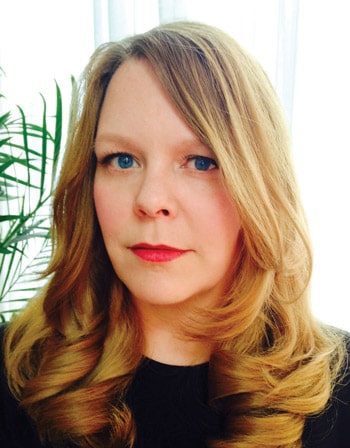
Dharma Arts as Divinatory Poetics :: Selah Saterstrom
Selah Saterstrom is the author of five books: Rancher, Ideal Suggestions: Essays in Divinatory Poetics, Slab, The Meat and Spirit Plan, and The Pink Institution. She teaches and lectures across the United States, and is the director of Creative Writing at the University of Denver.

Guest :: Rocío Cerón
Rocío Cerón (born 1972) is one of the major Mexican poets of her generation. Her work combines poetry with sound experimentation, performance and video. These pieces, created with what she named “Galaxy Projects: tons of body, voice, sonorities and image” have been showed at international venues as Cervantes Institutes of Berlin, London and Stockholm; Centre Pompidou, Paris; Southbank Centre, London, beside many others. She has written several volumes of poetry including Basalto (2002), Imperio/Empire (2009), Tiento (2010), Diorama (2012), Nudo vortex (2015) and Borealis (2016). Diorama was translated into English by Anna Rosenwong and won the Best Translated Book Award 2015, awarded by the University of Rochester. She has also been awarded with the National Award of Literature Gilberto Owen 2000 (Mexico) and the See America Travel Award 2005 (US). Her poems have been translated into English and diverse European languages. Actually, she is part of the National System of Art Creators of México (SNCA).

Guest :: Mayra A. Rodríguez Castro
Mayra A. Rodríguez Castro is a poet from Bogotá, Colombia. She is the editor of Audre Lorde: Dream of Europe (Kenning Editions). Rodríguez was the Anne Waldman Fellow at Naropa University (2019); she lives among cities.
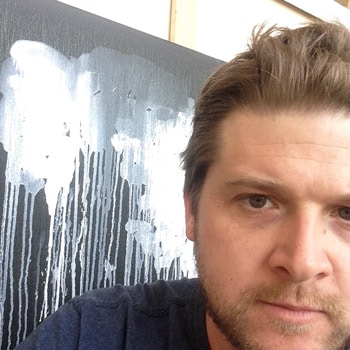
Harry Smith Recording Studio
Summer Writing Program participants (in select workshops each week) may have the opportunity to work in Naropa University’s Recording Studio. Sometimes the projects entail setting their work to music, or recording spoken word poetry, or recording their own poetic songs; oftentimes the recording studio projects are group collaborations, collective sound installations, and other experiments withthe phonotext. Over the year Fast Speaking Music has produced several audio anthologies of student and guest faculty’s recorded work; the Harry’s House cd compilations; here is the link to Volume III: https://spoti.fi/3v19mQP
Ambrose Bye is a musician, engineer, and producer living in Mexico City, and is the co-founder of Fast Speaking Music with Anne Waldman. He has produced over 20 albums and frequently collaborates with poets. Recent productions include “Among the Poetry Stricken” (Clark Coolidge and Thurston Moore) and “Artificial Happiness Button” (Heroes are Gang Leaders). He has worked and performed at Masnaa and the Ecole de la Literature in Casablanca, Le Maison de Poesie in Paris, the fieEstival Maelstrom in Brussels, the Henry Miller Library in Big Sur, Pathway to Paris at Montreal POP 2015, and Casa Del Lago in Mexico City. He has also been involved in the recording studio and workshops at the Summer Writing Program at Naropa University since 2009.
Fast Speaking Music



